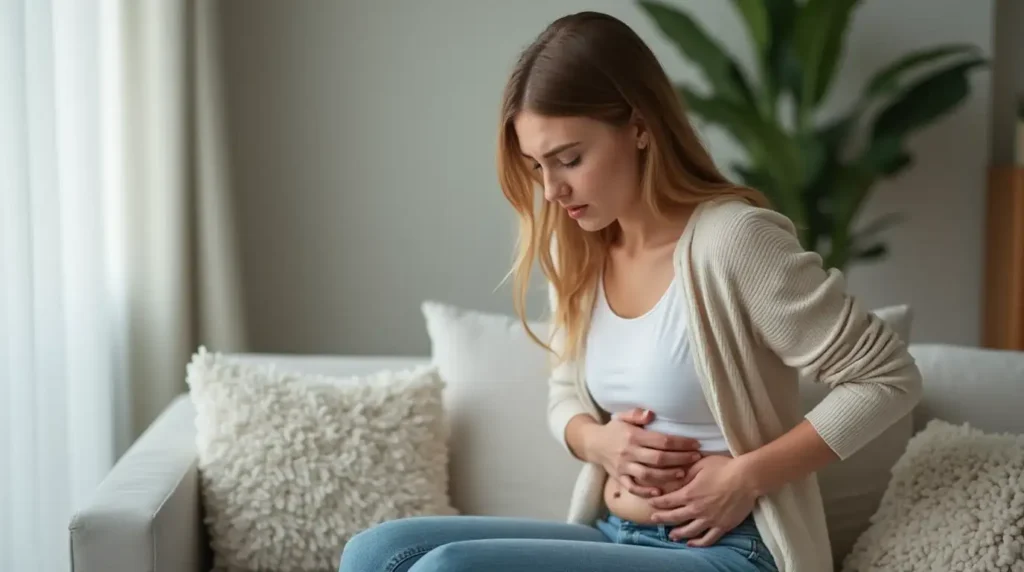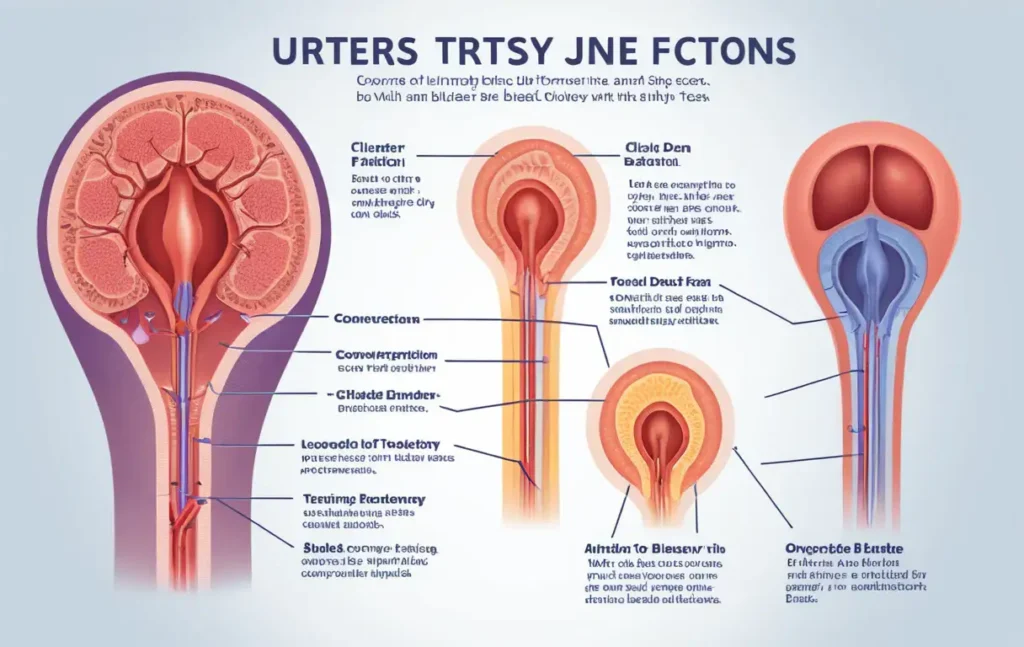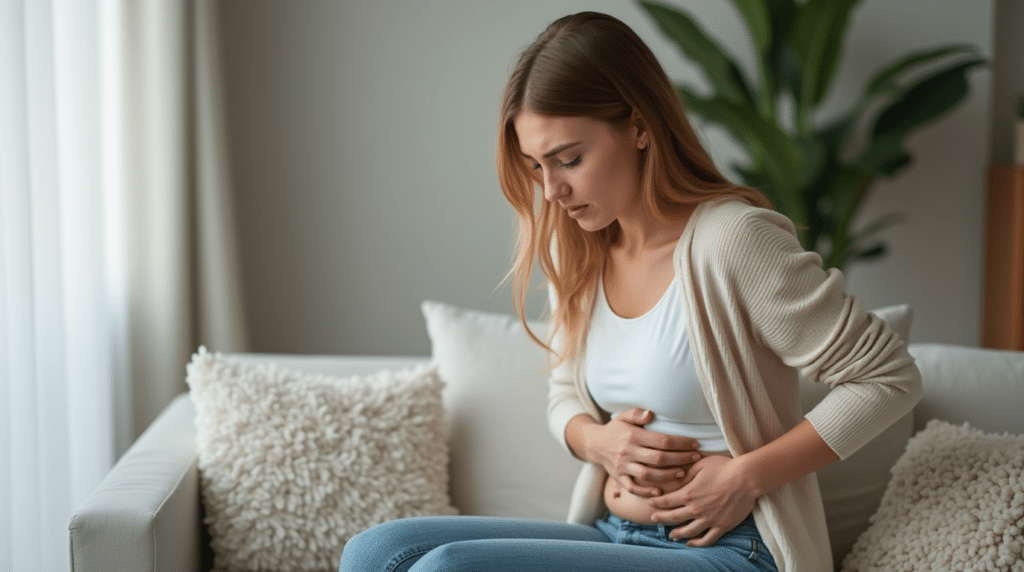Table of Contents
If you’ve experienced bloating in conjunction with the pain of the urinary tract infection (UTI) You’re not by yourself. Even though bloating can be attributed to digestive problems, it’s a surprise to many people that it could be a sign of a UTI may have a hand in the tight, swollen stomach. Is there a link between these two conditions? Can a UTI cause bloating?
In this article we’ll explain why UTIs are a cause of bloating The science that explains this link and how to seek relief. From identifying the cause to looking for effective remedies and tips for prevention, the answers are here for you to feel healthier and take charge of your health. Continue reading to find out all you need to know about bloating and UTIs. be able to ignore these tips!
The UTI may result in bloating in a few cases. The swelling and infection of the urinary tract may cause stomach discomfort, swelling or an uncomfortable feeling and is often caused by the accumulation of gas or changes to changes in the gut microbiome. Although it is not the primary cause, bloating can occur alongside other UTI symptoms such as the sensation of urgency, pain or frequent urine leaks.
Understanding Urinary Tract Infections (UTIs)
What Is a UTI?
The urinary tract infection (UTI) can be the result of bacteria that enter the urinary system, causing an infection in the bladder the kidneys, or urethra. The infections are more prevalent in women, however they may cause problems for any person.
Important facts about UTIs:
- Explanation: Most of the UTIs are due to Escherichia coli (E. coli) bacteria however there are other pathogens that could cause the problem.
- Types: UTIs can be classified by the portion that is the urinary system that is affected by the infection, for example cystitis (bladder infection) or pyelonephritis (kidney infection).
- Effect: If not treated If left untreated, UTI could become more severe, affecting the overall health and even causing symptoms including bloating or weight fluctuations.

Common Symptoms of UTIs in Women and Men
UTIs are characterized by many symptoms and some go beyond the urinary system and affect the general body health. The most common symptoms relate with urinary discomfort, some such as bloating may not be as widely acknowledged.
The most common symptoms of UTIs are:
- Urinary Symptoms:
- The sensation of burning or pain when you urinate
- Urinate frequently or in a hurry Urinate
- Strong-smelling, cloudy urine
- The urine contains blood.
- Systemic Symptoms:
- The abdominal pain and the feeling of bloating
- Pelvic or lower back pain
- The general body discomfort
- Additional Signs in Severe Cases:
- Chills and fever (may suggest kidney problems)
- Gain or weight gain caused by change in appetite, or even water retention
Even though bloating isn’t the most common UTI sign, it could occur as your body reacts to infection and inflammation due to bacteria. Knowing the symptoms could help you get urgent therapy and get relief.
The Link Between UTIs and Bloating
Bloating isn’t the first sign that is associated with UTI However, it may be a result of the body’s response to infection. An imbalance in bacterial or inflammatory processes and other rare conditions could all be contributing to the uncomfortable symptoms. Knowing these connections will help you control your health and provide the most effective relief.
How Can a UTI Cause Bloating?
The urinary tract infection (UTI) could result in bloating due to a mixture of bodily responses as well as systemic impacts:
- Inflammation is the body’s immune reaction to bacteria within the urinary system could result in swelling of the surrounding tissues and cause the sensation of bloating.
- Gas Production: Certain infections could disrupt the normal digestive process, causing gas to rise and abdominal pain.
- Inflammation: UTIs may trigger the body to store fluids. This can cause bloating and temporary weight gain.
Being aware of these symptoms earlier and implementing an appropriate therapy is crucial to relief as well as general health.
The Role of the Gut Microbiome
The gut microbiome is a crucial part in general health as well as the link with UTIs as well as bloating:
- Unbalanced Microbiome: UTIs brought on by bacterial infections could cause imbalances between the good and bad bacteria within the gut and can cause bloating as well as digestive problems.
- Drugs that are used for treating UTIs may inadvertently alter inadvertently alter the gut microbiome, causing digestive symptoms including bloating and uncomfortableness.
- Inflammatory Response deficient or overactive immune system can connect gut health in urinary symptoms and cause negative effects that cascade down the body.
Helping to maintain gut health via probiotics as well as diet changes can assist in reducing bloating both during and following a UTI.
Emphysematous Cystitis and Severe Cases
In very rare cases, UTIs can lead to an emphysematous cystitis that is a severe illness that leads to excess gas production within the bladder.
Important facts concerning Emphysematous Cystitis:
- What is it It is a rare form of UTIs that occurs when gas-forming bacteria can cause gas pockets to develop in the bladder.
- The symptoms include severe bloating and abdominal pain and other signs of systemic illness like chills, fever.
- People at Risk: Most prevalent in those who suffer from diabetes or have impaired immune systems.
- Treatment: Immediately commenced medical therapy typically with antibiotics, and sometimes the need for surgical intervention.
Though emphysematous cystitis can be found in a small percentage but understanding its symptoms and risk factors is crucial to ensure rapid detection and relief.
If you recognize how UTIs result in bloating and knowing the causes, you are able to be proactive in addressing the root of the issue and bring back equilibrium to your body.
Can UTIs Cause Weight Gain or Stomach Distension?
Although the presence of a urinary tract infection (UTI) isn’t usually associated with substantial weight gain however, it may result in temporary fluctuations in weight and stomach dilatation. This is usually due to your body’s response to infection and the associated inflammation. We’ll look at the connection with UTIs, weight, and bloating to learn about these relationships more thoroughly.
Experimenting Weight Changes that Are Associated With UTIs
UTIs can trigger temporary weight fluctuation due to various elements that are related with the infection:
- Fluid Retention: Inflammation triggered by bacteria that cause UTI may cause an increase in water loss, which makes the body feel weightier.
- Alterations in diet or appetite The feeling of discomfort and bloating due to an UTI could affect appetite leading to a perception of weight shifts.
- Digestive Disruptions: The antibiotics that are used to combat UTIs could affect gut bacteria which could cause bloating and causing feeling that you’re experiencing weight gain.
- Low Activity Levels: The pain or fatigue due to UTI symptoms can result in less physical exercise that can affect weight.
Although these modifications are usually only temporary, dealing with the root infection through the correct therapy helps restore harmony in your health as well as your body.
Stomach Distension and Pelvic Pain
Stomach ditension is often described by a tight or swollen abdominal feeling It is not as well-known however it could be a sign of UTIs:
- Inflammation is the body’s reaction to urinary bacteria may cause swelling of the pelvic or abdominal regions, causing visible bloating.
- Pelvic Pain: Several patients suffering from UTIs have discomfort in the lower abdominal area, and it can appear as cramps or pressure.
- Gas and discomfort: A disruption of the gut microbiome during an UTI could trigger an increase in gas production and can cause a worse discomfort of bloating and dilation.
For managing stomach distension as well as pelvic pain
- Get medical relief in the case of UTI symptoms using the suitable therapy.
- Help maintain gut health by drinking plenty of water as well as incorporating foods that support gut health.
- Make use of the heat therapy or painkillers available over the counter for pelvic discomfort.
Being aware of the symptoms will assist you in taking proactive steps towards reducing bloating and returning the overall urinary as well as digestive health.

Diagnosing a UTI
Correctly diagnosing the cause of urinary tract infection (UTI) is vital to ensure prompt therapy as well as relief from symptoms such as bloating or pain and discomfort. An accurate diagnosis will ensure that the source of the infection is determined, which allows for efficient treatment to avoid complications and restore health.
Common Diagnostic Methods
Health professionals use a range of techniques to identify UTIs that range from basic tests to more thorough tests:
- Urinalysis:
- The urine sample is examined for signs of bacteria and white blood cells and other indicators of infection.
- It is the most commonly used and simple diagnostic tool to diagnose UTIs.
- Urine Culture:
- An additional test is required can be used to determine the type of bacteria that causes the infection.
- It assists in the selection of which antibiotics are most effective to use in therapy.
- Physical Examination:
- Healthcare professionals can look for tenderness within the abdominal or pelvic region, which could indicate an UTI.
- The signs and symptoms like bloating, weight changes, as well as urinary discomfort can also be assessed.
- Imaging Testing (in instances of severe or recurring instances):
- Ultrasounds CT scans or X-rays can be utilized to determine structural problems inside the urinary system.
- They are useful for the detection of kidney problems or stones.
A prompt diagnosis using these techniques will help avoid complications and offer targeted relief to UTI symptoms.
What Negative Test Results Could Mean
Some people experience UTI-like symptoms that include bloating or urinary discomfort. However, they get negative results from tests. What could this mean:
- Interstitial Cystitis (IC):
- Chronic bladder disease similar to UTI symptoms however it isn’t due to bacteria.
- Pelvic pain, bloating as well as frequent urination, are all common among patients with IC.
- Non-Bacterial UTIs:
- The fungi and virus may not be visible on a standard bacterial test.
- More testing could be needed in order to pinpoint the source of the problem.
- Gut and Bladder Connection:
- Infections that disrupt the gut microbiome could be a symptom of UTI symptoms which can cause bloating and abdominal pain.
- A focus on gut health could offer relief even if tests show no improvement.
- Other Conditions:
- Kidney stone, pelvic floor issues or other gynecological conditions could cause the same symptoms.
- Diagnostic tools that are advanced or referral to specialists could be needed.
Knowing the diagnostic techniques and potential factors that could cause negative results will ensure that you get the right therapy for improving urinary and general health.

Treating a UTI and Managing Bloating
Successfully treating UTI and relieving the bloating is a mix of medical therapy as well as lifestyle changes. By using the appropriate method, you will be able to ease pain, restore the balance of your body and stop further complications.
Quick Relief for UTI-Induced Bloating
Bloating caused by an UTI isn’t the most pleasant experience however these guidelines may provide fast relief:
- Stay Hydrated:
- A good intake of fluids helps to flush bacteria out of the urinary system, and also reduces inflammation.
- Hydration can also help improve gut health as it helps reduce bloating.
- Apply Heat Therapy:
- Apply a warm, padded or heating pad to the lower part of your abdomen to ease bloating and pelvic pain.
- It boosts blood flow and decreases inflammation of the area affected.
- Avoid Gas-Producing Foods:
- The consumption of foods like broccoli, beans as well as carbonated drinks can make it worse bloating.
- Opt for meals that can be digested easily in order to manage UTI symptoms.
- Probiotics for Gut and Urinary Health:
- Consume probiotic-rich foods such as yogurt or supplements for restoring gut health.
- Probiotics could also decrease the incidence of UTIs because they promote the health of your urinary surroundings.
Medical and Home Remedies
The root of the infection is vital for lasting relief as well as general health. The combination of both medical and homemade remedies can prove successful:
- Medical Treatments:
- Antibiotics: The prescribed antibiotics are aimed at and eradicate the bacteria that cause UTI. Completely completing the course is crucial for effective therapy.
- Pain Relief: Prescription medications such as Ibuprofen are able to lessen inflammation as well as ease bloating and discomfort.
- Home Remedies:
- It isn’t the cure for all ailments, cranberry juice that is not sweetened juice may help improve urinary health through stopping bacteria from adhering to bladder’s wall.
- D-Mannose Supplements are a natural sugar which can help lower the frequency of UTIs and help improve urinary health.
- Epsom Baths with Salt: Relaxing in a soothing Epsom salt bath will help relax abdominal muscles as well as lessen bloating.
- Dietary Adjustments:
- Cut down on salt intake in order to lessen water retention. This is an important factor in bloating.
- Choose foods high in fiber for maintaining gut health throughout and after UTI treatment.
When you combine these medications with homemade remedies, you will be able to efficiently deal with UTI symptoms and restore your health. Treating bloating in conjunction with infection therapy will provide an all-encompassing relief of your body as well as your urinary system.

Preventing UTIs and Related Discomfort
Prevention is essential to avoid UTIs and the uncomfortable symptoms which include bloating and abdominal discomfort. Making healthy choices can dramatically lower the chance of developing infections and improve general urinary as well as gut health.
Staying Hydrated
Hydration and proper hydration are essential to stopping UTIs and keeping an overall healthy urinary system.
- Flush Out Bacteria:
- The consumption of plenty of water can help to flush bacteria out of your urinary tract, which reduces the chance of infection.
- Maintain Gut and Urinary Health:
- Being hydrated can prevent dehydration which could cause disturbances to gut equilibrium and increase the risk of bloating.
Dietary Tips: Cranberry Juice and Beyond
Diet plays an important function in preventing UTIs and ensuring general health:
- Cranberry Juice:
- The unsweetened juice is a source of compounds that can help stop bacteria from adhering to bladder’s walls.
- Probiotic-Rich Foods:
- Incorporate yogurt, kefir along with other probiotics that can help improve gut health and decrease UTI incidence.
- Avoid Irritants:
- Limit your consumption of alcohol, caffeine as well as spicy food items, because they could cause irritation to the urinary tract.
Healthy Bathroom Hygiene Practices
Hygiene is crucial in preventing bacteria from settling into the urinary tract.
- Wipe Correctly:
- Always wash all over the body in order to keep bacteria in the anus from getting into the urethra.
- Gentle Cleansing:
- Beware of harsh soaps and feminine products, which can alter our body’s normal balance, and can increase infection chance.
Clothing Choices: The Role of Breathable Fabrics
Your clothes can influence your chances of getting UTIs as well as related bloating:
- Opt for Cotton Underwear:
- Cotton improves airflow and allows for better ventilation and reduces moisture in the areas where bacteria could thrive.
- Avoid Tight Clothing:
- Fabrics made of synthetic and tight jeans are prone to trapping moisture and heat and increase the likelihood of infection.
Importance of Urinating After Intimacy
Intimacy-related habits in the postpartum period are vital to UTI prevention
- Flush Out Bacteria:
- After sexual activity, urination helps eliminate bacteria which may have entered through the urinary tract.
- Stay Hydrated During the Day:
- Drinking water is essential to ensure adequate flow of urine to ensure urinary health.
If you follow these steps to prevent by following these preventive measures, you will reduce your likelihood of getting UTIs and prevent symptoms such as bloating and pain. The small, yet significant improvements will help you maintain longer-term health as well as relief.
When to Seek Medical Attention for UTI Symptoms
While a majority of UTIs can be treated by using home remedies or over-the-counter remedies, certain situations need urgent medical attention to avoid problems and safeguard your health. Being aware of when to see with a medical professional is vital for efficient therapy and long-lasting relief.
Recognizing Severe or Persistent Symptoms
If you are experiencing chronic or severe UTI symptoms It is essential to consult a doctor. Watch out for the following warning signs among many others:
- Intense Pain:
- Pain in the pelvis or abdomen that is more severe than typical UTI pain.
- High Fever or Chills:
- It indicates that the infection might have gotten into the bloodstream, kidneys or even the kidneys.
- Blood in Urine:
- Hematuria (blood in the urine) indicates an serious infection which requires prompt treatment.
- Frequent or Uncontrollable Urination:
- In the event that the need to urinate gets constant, it can disrupt everyday life.
- Lack of Relief After Initial Therapy:
- Consistent symptoms persist despite the use of home remedies or antibiotics.
Medical attention promptly can help prevent severe complications such as kidney infections or persistent urinary problems.
Other Causes of Bloating and Frequent Urination
At times, bloating as well as frequent and frequent urine might not be due to the presence of a UTI. If symptoms persist following therapy or appear to be unrelated to normal UTI symptoms, think about these additional possible causes:
- Irritable Bowel Syndrome (IBS):
- IBS may cause bloating as well as frequent and excessive urination as a result of its impact of the gut and bladder.
- Hormonal Changes:
- The hormonal fluctuations, particularly in women, can lead to bloating as well as urinary shifts.
- Bladder or Kidney Stones:
- Stones may cause irritation to the urinary tract and mimic UTI symptoms.
- Dietary Intolerances:
- Certain foods can trigger bloating and may increase urinary frequency, like gluten or lactose.
- Interstitial Cystitis:
- An ongoing bladder problem that causes regular urination and pain, with no infection.
If the symptoms persist or become worsening you should consult your physician for an extensive evaluation in order to find the source of the problem and provide the appropriate relief.
When you are able to recognize symptoms of severe UTI symptoms and examining alternative sources of discomfort, you are able to make the necessary steps towards keeping the body’s health and wellbeing.

FAQs About UTIs and Bloating
1. Does an UTI trigger stomach bloating?
Yes it is true that an UTI could create bloating because it can cause irritation to the bladder as well as its surrounding regions and cause digestive symptoms including bloating or discomfort.
2. Could an UTI result in stomach fat?
Even though an UTI does not cause abdominal fat, it may result in some water retention that could cause bloating or a feeling of fullness around the stomach.
3. What does an UTI cause to your stomach?
UTIs can be a source of discomfort. UTI could cause abdominal discomfort, bloating, and sometimes painful, especially when the infection is spread or affects other organs, such as the stomach.
4. What can I do to de-bloat my stomach quickly?
For quick relief from bloating to ease bloating, drink lots of water, do some light exercise or sip hot herbal teas like peppermint or ginger.
5. What are the five indications of bladder infection?
The five most frequent symptoms of a bladder infection include:
- Urinary urges that are frequent
- Burning or pain during urination
- Urine that is cloudy or strongly-scented
- Pain in the lower abdomen or pelvis
- The urine contains blood.
6. What can you tell when you have a UTI has extended to the kidneys?
If an UTI is spread to the kidneys, symptoms may include high fever, back pain that is severe as well as nausea, chills and aches. Take immediate medical treatment when such symptoms appear.
7. What is the time frame to allow a UTI to develop into a kidney infection?
An UTI could lead to kidney infection within days if it is not treated so it is imperative to get treatment promptly.
8. Which are symptoms of a urinary infection for females?
The most common symptoms of females include frequently frequent need to urinate. burning sensations during urination, dark or foul-smelling urine. Also, pelvic pain and blood in urine.
9. What can you do to eliminate bloating due to an UTI?
For relief from bloating due to the UTI Drink lots of fluids, stay away from the irritants such as alcohol and caffeine and take prescription antibiotics. Consult a healthcare provider if bloating persists.
10. Does an UTI result in a look of bloating?
It’s true that UTIs are very common. UTI may cause you to suffer from bloating due to swelling and retention of water due to the infection which can cause an abdominal swelling that is temporary.
Conclusion
While the symptoms of a UTI is unlikely to result in long-term weight gain or abdominal fat, it will result in temporarily bloating and abdominal pain. Recognizing the link with UTIs, bloating, and associated symptoms is crucial in taking care of your health and avoiding further issues. If you’re suffering from UTI symptoms It’s crucial to seek immediate medical attention and take preventive steps including staying hydrated, keeping high hygiene levels, and making wise choices regarding your diet. By taking the appropriate treatment and care it is possible to get relief in both UTI pain and bloating and help you to get back to the normal self you are. Keep an eye on your health and consult with a physician whenever you need it. Your well-being is worthwhile!


